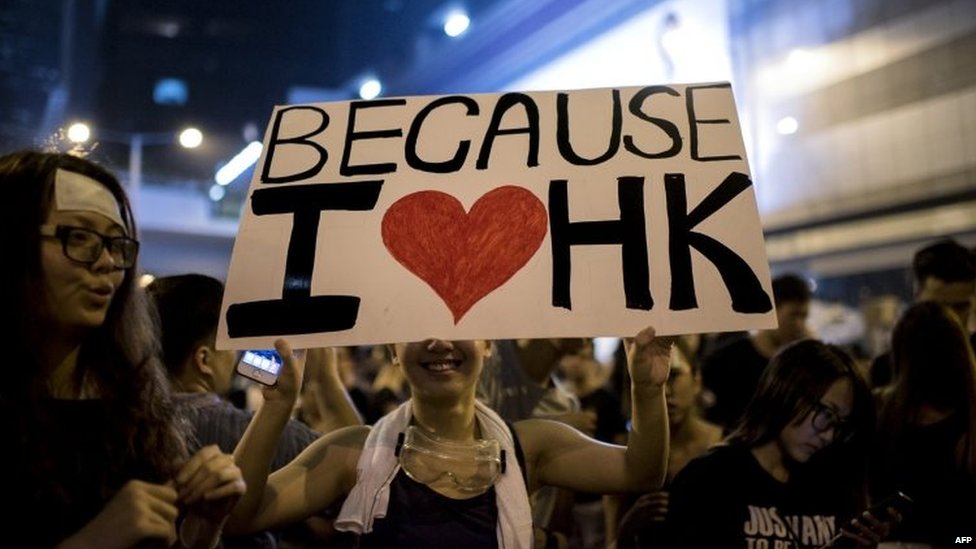Students and other Hong Kong residents have been protesting in front of the Central Government Complex, over the Chinese Governments announcement it will pre-approve up to three candidates to run in the elections for the Chief Executive of Hong Kong. The protests in Hong Kong have raised questions sovereignty and China’s role in Hong Kong. I do not think the current crisis is a security or democratic issue, it is a crisis of identity.
Hong Kong is a state of China, it is not independent. Upon independence from Britain it was agreed Hong Kong would be ruled under the principle of “one country, two systems”. If this were a state within America, or even a province in Canada, and the government decided to nominate candidates to then be publicly elected (in effect what currently happens with nominations for MPs), few could disagree. The national government holds ultimate executive and legislative control over the senators and therefore has the choice of who will be nominated or even that of the final representative.
In some countries, yes this position is democratically elected, but in others, such as Canada or the United Kingdom, they are not. They are appointed by the government. Perhaps, it can be argued this is mainly because the government of Canada is a democracy and that the leader is democratically elected, therefore deeming that his choice of candidates will be representative of the voice of the majority of people within the country. The key point here is that, it is also within his right to elect these individuals.
The government of China isn’t selecting the chief executive, but rather it is veting the candidates. As Mr Hoo was quoted saying: “The people on the streets are asking for the right to nominate. Universal suffrage, under the international covenant, means that there are express rights to elect or be elected. There is no express right to nominate.” This is a crucial argument, though some dispute it. Democracy ensures the rights of citizens to elect their representative, and it generally understood that all individuals should have the right to put themselves forward for nomination if they choose to. But it does not specify that all citizens will have the right to nominate. If they did have the right to do that it would create an inefficient political system as there would have to be one election to nominate candidates and then another to select the ultimate winner. Though a party system simplifies this, Hong Kong does not currently follow this for its Chief Executive.
As such, I do not believe the there is a democratic crisis in Hong Kong. A democratic process will be one where the selection of the chief executive is upon the nomination by a broadly representative nominating committee. The new rules will require this, the candidates for chief executive must gain the support of a majority of a nominating committee.
The really issue is here, is that of identity! Hong Kong has a “high degree of autonomy” from China but it is “not full autonomy”. Many of the citizens of Hong Kong seem to be questioning this. There is a growing sense of dislocation among a section of Hong Kong’s population. In recent history Hong Kong has been the beneficiary of China’s growth, attracting multinational corporations and banks that wanted access to the Chinese market. This generated a great sense of arrogance. Hong Kong Chinese have come to enjoy much higher standards of living that the mainlanders, creating a sense of inferiority. However since 1997 the Chinese economy has grown at incredible rates, as has the standard of living. Leading to Hong Kong losing its role as the gateway to China, it is no longer the financial centre for the nation, nor is it the shipping hub it once was.
Therefore I believe Hong Kong is going through an identity crisis as its citizens come to realise their future is inextricably bound up with that of China.
The first step to recovery is acceptance, and right now Hong Kong is in denial, denial denial! In light of realising that they are inextricably bound up with that of China, Hong Kongers are going to panic – as can currently be seen. This being said, realising and accepting are two very different things. Hong Kong is going to have to come to terms with the fact that China is its future, despite much of the populations resistance. As such, at its core, this protest is one of identity not democracy. It is a protest trying to sustain Hong Kong’s identity as one of the strongest areas of China and as one that the Chinese government cannot just dictate to. Only after Hong Kong recognises the evident problem, will it be able to work out its new role as one system within a growing country.
